From November 22 to 24, 2021, the next capacity strengthening workshop was held for those enrolled in the Yoff Artisanal Fisheries Academy, Senegal. This workshop was long awaited because the activities of the academy had been put at half mast for almost two years because of the health crisis. The objective of the workshop was for the participants to take stock of the work accomplished, to continue with the analysis of the value chain of artisanal fishing in the Yoff area and to develop individual and collective action plans for the next 12 months.
The workshop with 28 registered participants was facilitated by a team made up of Floriane Thouillot, Oumar Dieng and Aïssata Ndiaye, all members of the NGO Gret, Mamadou Mbaye, Mandione M’bengue and Marième Soda Seck, as co-facilitators and resource people of Yoff as well as Aliou Sall, vice-president of Mundus maris, and Souleymane Sow of the local NGO CREDETIP.
For the opening session Ms. Cornelia Nauen, president of Mundus maris, addressed a word of welcome via teleconference to those present. She congratulated the members of the academy for the progress made while recognising the support of APECSY and Freys Yoff who monitor the work. She expressed her organisation’s desire to continue supporting the Academy’s next steps in Yoff.
Indeed, the presence of the main representatives of the customary authorities demonstrates how the initiative enjoys recognition at the community level: the imam of the community, Mr. Cheikh Sall, the Jaaraaf of Yoff, who has a role as president of the entire community, Mr Seyni Guèye, the President of Freys Yoff, which is the organisation in charge of local governance in the global sense of the term, Mr Birane M’bengue. They spoke in turns and appreciated that the initiative could continue to gain ground despite the health crisis. They also expressed their great interest by recalling that they had also been at the opening of the first workshop and that they were present despite their currently busy schedule. Mr. Aliou Sall, on behalf of Mundus maris, took the floor last reiterating the commitment of his organisation within the limits of its possibilities to continue to support the Yoff Academy for achieving its objectives.
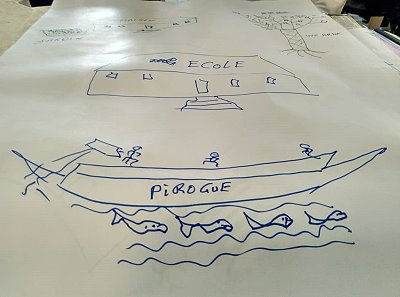
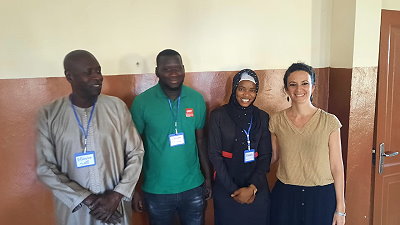
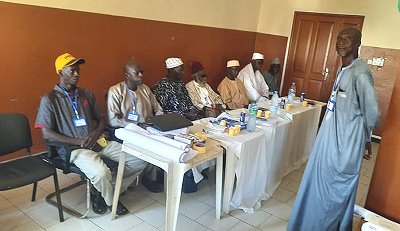
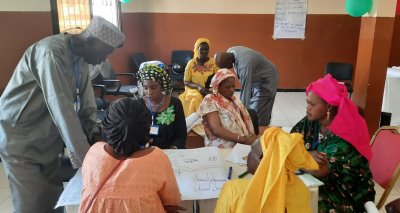
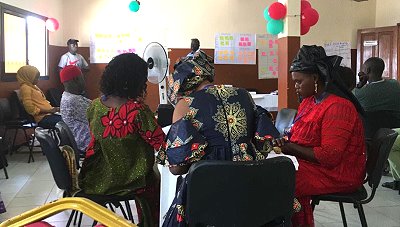
Following these preliminaries, the work started with a reminder of the last activities and introduced the planned activities of this workshop. Aliou Sall, who is also the national coordinator of the artisanal fisheries academy, and Abdoulaye Gueye, president of the Yoff Academy committee, updated the participants.
The first session consisted in following up and taking stock of how the academy learners had kept their individual notebooks. The dialogue centred on the analysis of how the individual and group work started since the first workshop had continued. More specifically, the retrospective critical reflection on the one-year action plans aimed to check how the participants had used their individual notebooks and whether they had been able to do their homework. Except for two participants all had their notebooks with them and in order.
On the occasion of the presentation of the individual assessments, the participants explained how they have worked to enhance their knowledge since the first workshop. They had proceeded as follows:
-
In many instances they had engaged in family exercises, which aroused great interest not only between spouse and husband but also on the part of the children. This is illustrated by some drawings that were shared by the participants during the workshop, such as drawings made by their children as they see happy life.
- We also note the extension of the workshop approach to the fishermen’s shelters because the method is discussed with trials of drawings under the leadership of fishermen who have already practiced it.
The value chain analysis was developed in a comprehensive and participatory manner during the second seminar held. But coming back to this during this workshop made it possible to appreciate a certain number of changes that have occurred to the detriment of women. The women are the main actors in the postharvest value adding activities as they are micro-fishmongers. They note the major changes that have taken place as follows:
-
The fact that new categories of fishmongers arise who are exerting strong competition. These were initially simple fish carriers or carters but who have built up enough capital to enter commercial circuits with the support of large fishmongers. This thus comes to be added to the direct competition of the big fishmongers to which these women are already subjected.
-
The Covid pandemic, with the draconian measures that have been put in place, has deeply affected the women for the following reasons (i) the hours imposed for the opening and closing of the fish landing platforms were not adapted to their working hours (ii ) those who had middle class clients in residential areas lost interesting opportunities given the imposed social distancing, etc.
The last session was devoted to developing an individual action plan over a period of twelve (12) months by each academy learner. As in the past, participants identified intermediate targets and what actions needed to be taken to achieve them. These intermediate stages were set in terms of six months or three months, depending on the nature of the individual projects and the constraints identified by each person. The projects are all about how to improve the living conditions to lead a happy life. The economic dimension is important but we felt more and more emphasis on the two other dimensions linked to the social needs and the environment as follows:
-
Access to decent living conditions were expressed forcefully as an objective
-
Practically all academy learners identified schooling their children as a priority
-
The need to have trees near the family’s living spaces was a common feature of projections for the future.
During the exercice, participants elaborated also on the constraints and the opportunities to achieve their objective. The constraining factors most frequently cited are:
-
Social pressure in that even if participants make an effort to reorganise their lives through reduced spending, there are obligations to be honored. In addition to this, women who care about their childrens’ schooling point out that the cost of schooling is a burden.
-
Access to raw material (fish) is less and less guaranteed.
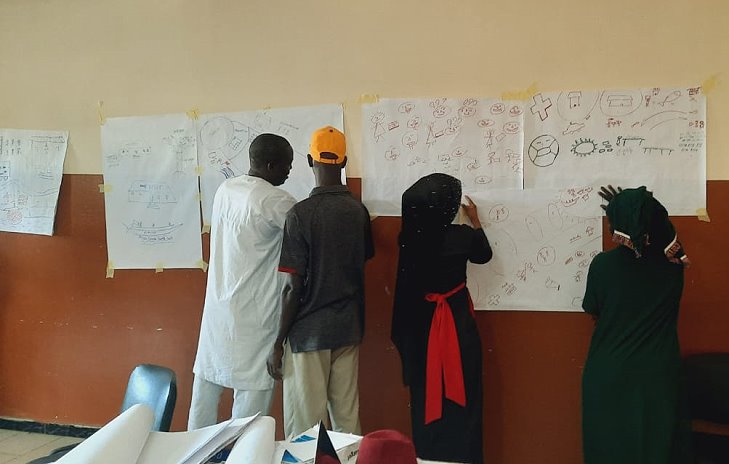
In terms of opportunities, three elements were raised as the most striking among many others, namely:
-
The fact that fish is a product in demand, that is to say that the market is still there.
-
The fact also that the academy is a framework which allowed them to develop another form of solidarity.
-
Both women and some men have started to set up tontines between members who have known each other in this context. Some examples were given during the workshop.
The dialogue about objectives at the collective level were most intense in four working groups and then results presented and discussed in plenary by prioritising the opportunities and the most important potential actions. This plenary was an opportunity to discuss the factors that influence the framework of each segment of the value chain. Participants paid attention to governance as it refers to groups, Economic Interest Groups (GIEs), the local artisanal fisheries committee (CLPA), administrations, access to certain general services or not, etc. On this occasion, they also discussed what would be realistic objectives for organising advocacy work in relation to the institutions identified to improve the framework for the implementation of individual and group plans. Some of these elements appear in the outline of an action plan that was started but not finalised due to time constraints.
As presented, it was very difficult for the participants to narrow the focus on few constraints for achieving their individual and collective objectives. The problems unanimously identified are multiple: pollution, scarcity of fisheries resources resulting from the competition of industrial fishing vessels, climate change and atrocious competition women experience when trying to access to fish raw material.
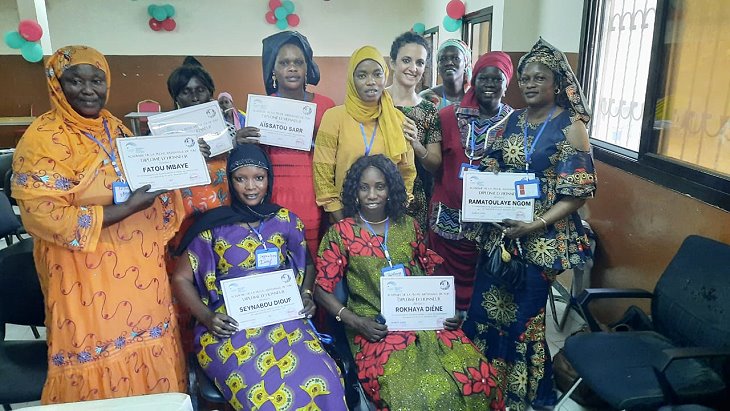
The closure of the workshop took place on November 24 at around 5:00 pm in the presence of the three community leaders, who had attended the opening, in addition to the vice president of APECSY, Mr. Abdou Aziz Thiaw, who praised the work of Mundus maris in the Yoff community. They all reiterated their availability to support the pursuit of our goals in circumstances where Mundus maris believes they could be of some use.
A big thank you for the collaboration as well as a special recognition – at the risk of not mentioning all of them – to Abdoulaye Guèye, president of the Yoff committee of the Academy, Soda Seck and Mandioune Mbengue for their particular commitment already from the first preparations.
Small-Scale Fisheries Academy
- Make Fishing Fair in the EU, 25 March 2025
- Human – Biodiversity Relationships Across Scales
- World Fisheries Day, 21 November 2024, celebrated in Nigeria
- Mundus maris participated in the 2024 World Fisheries Day organized by Canoe and Fishing Gear Association of Ghana (CaFGOAG).
- Mundus maris contribution to the UNOC3 public consultation
- Small-Scale Fisheries Summit in Rome, 5-7 July 2024
- Regional Symposium on European Small-Scale Fisheries, Larnaca, Cyprus, 1-3 July 2024
- Baltic Fisheries Emergency Meeting, Brussels, 26 June 2024
- Ambivalent role of Market and Technology in the Transitions from Vulnerability to Viability: Nexus in Senegal SSF
- Shell fisheries as stewardship for mangroves
- African edition of 4WSFC in Cape Town, 21 to 23 November 2022
- World Fisheries Day, 21 November 2023
- Webinar: Nigeria’s Fisheries challenges and opportunities
- Presenting the FishBase app at the Symposium in Tervuren
- MARE Conference on Blue Fear – Mundus maris reflects
- The Transition From Vulnerability to Viability Through Illuminating Hidden Harvests, 26 May 2023
- EGU sessions focused on geoethics and joint learning, 23-28 April 2023
- Solidarity with artisanal fishers in Senegal and Mauritania
- The legal instruments for the development of sustainable small-scale fisheries governance in Nigeria, 31 March 2023
- Tools for Gender Analysis: Understanding Vulnerability and Empowerment, 17 February 2023
- Community resilience: A framework for non-traditional field research, 27 January 2023
- Sustainability at scale – V2V November webinar
- European edition of 4WSFC in Malta, 12-14 September 2022
- Mundus maris contributes to SSF Summit in Rome
- Women fish traders in Yoff and Hann, Senegal, victims or shapers of their destiny?
- The Academy continues its work in Yoff
- Illuminating the Hidden Harvest – a snapshot
- Virtual launch event FAO: International Year of Artisanal Fisheries and Aquaculture
- The Small-Scale Fisheries Academy as a source of operational support to PA Guidelines
- World Fisheries Congress, Adelaide, 20-24 September
- Mundus maris supports the fight of Paolo, the fisher, in Tuscany, Italy
- Catching-up – SSF Academy Yoff, 27 Febr. 2021
- Strengthening capacities of the actors for sustainable small-scale fisheries
- Testing training methods during the pilot phase of the SSF Academy in Senegal
- A premiere – launch of a Small-Scale Fisheries Academy in Senegal
